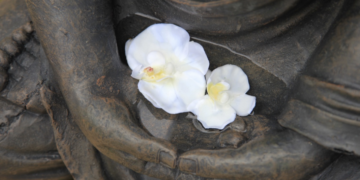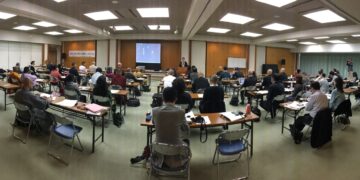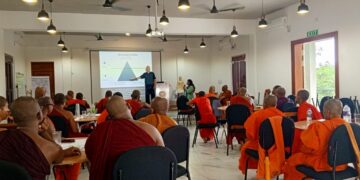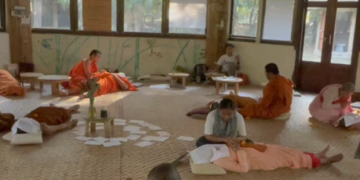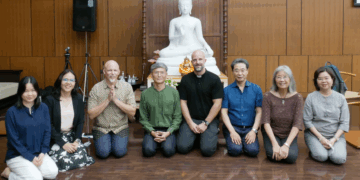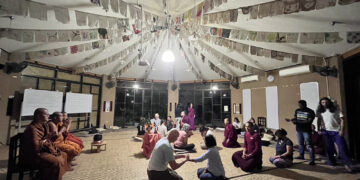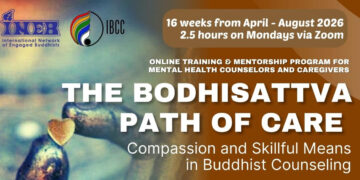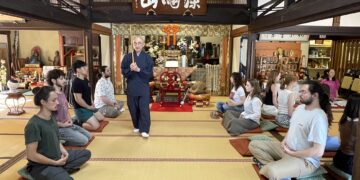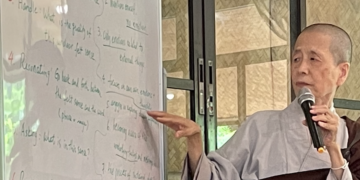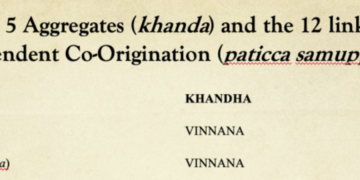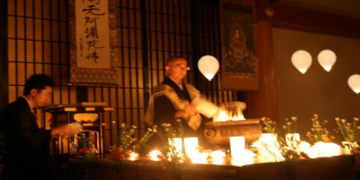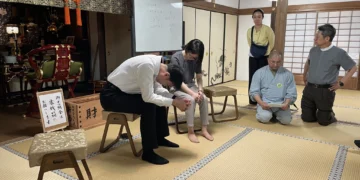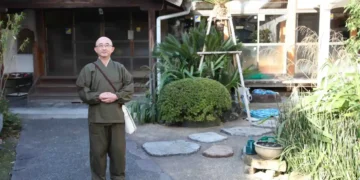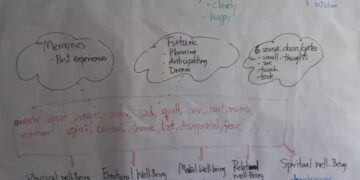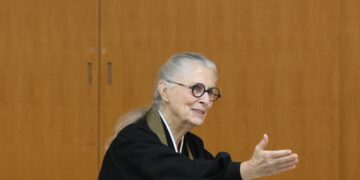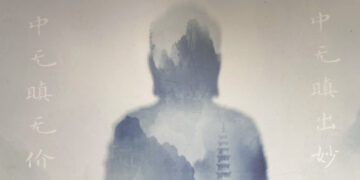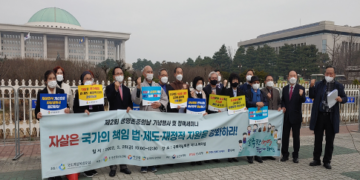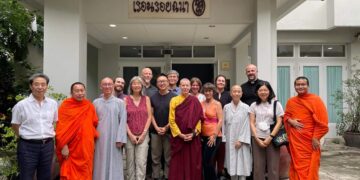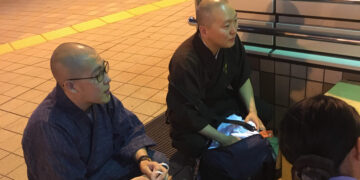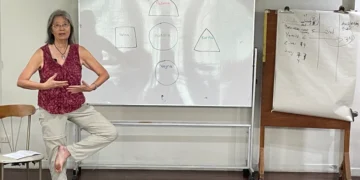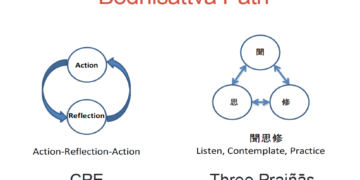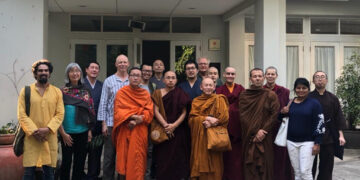Borobudur, Indonesia
February 9-13, 2026
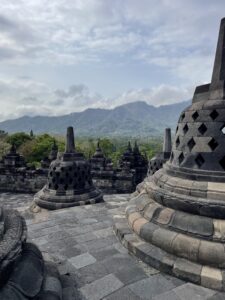 Have you faced death directly before in your own mortality? Have you ever sat with someone in their last stages of life? Have you contemplated taking your own life? Have you worked with persons so desperate that they simply wish to “disappear”, unable to die but unable to live?
Have you faced death directly before in your own mortality? Have you ever sat with someone in their last stages of life? Have you contemplated taking your own life? Have you worked with persons so desperate that they simply wish to “disappear”, unable to die but unable to live?
Facing death directly with mindful awareness and grounded embodiment is a practice taught through all Buddhist traditions, from the Buddha’s Four Foundations of Mindfulness to the Heart Sutra’s exhortation of “no birth, no death” to the Pure Land practice of welcoming Amitabha at the moment of death to the Tibetan practices of the bardo. These practices not only help transform the deep psychological distortions of our fear of death but also empower us to deal with the loss and grieving of loved ones and wider forms of loss, like war, genocide, and environmental destruction.
For a Buddhist based therapist or a counselor who is interested in using Buddhist teachings, how can these ancient practices be applied today to our largely urban, capitalistic societies where mental health is such a problematic issue and a massive generation of elderly need support in their final days. This three day workshop will provide: 1) knowledge of the fundamentals of Buddhist based counseling, 2) role plays and group work to internalize them, and 3) experiential practices to confront death and gain new insights from the deepest of Buddhist meditation topics.
The staff is an international one with trained professionals from Japan, India, Indonesia, and the United States. As part of the ongoing work of the Institute of Buddhist Counseling and Chaplaincy, further opportunities will be provided for study and training as a follow up to this workshop. We welcome your participation!!
Daily Timetable:
- Morning: Breakfast: 6:00-8:30 plus optional walks & exercise & sharing meditation
- Session 1: 9:00-12:00 (tea break halfway)
- Lunch: mindful eating of one ingredient (1st 10 minutes in silence)
- Session 2: 13:00-17:30 (total relaxation/5 sense meditation at 15:00)
- Dinner: mindful eating of one ingredient (1st 10 minutes in silence)
- Session 3: 19:00-21:00
Schedule:
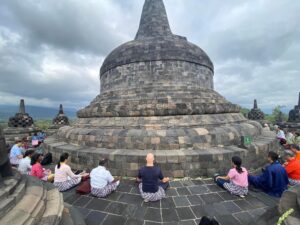
2/9 main arrivals → 90 minutes from the new Yogykarta International Airport to Borobudur.
- Evening: orientation and group processes to connect participants through sharing backgrounds, expectations, and future goals
2/10 Encountering Death
- Morning I: Introduction to the whole program followed by entry into death perspectives
- Afternoon/Evening: Tabidachi death workshop with Rev. Nemoto Jotetsu
2/11 Buddhist Counseling with SOTTO Suicide Prevention Group from Japan
2/12 Buddhist Counseling with Nida Shaikh from India
2/13 Closing Ceremony & Pilgrimage @ Borobudur Temple
- 12:00 check-out & departure
PARTICIPANTS:
- 35 persons in the Southeast or South Asian areas with present careers or ongoing education in counseling and therapy. Indonesians who speak English may also apply but their quota will be set at 15-18 persons.
FEES:
- $250 for the training plus lodging, meals, and transport to the venue
- a limited number of stipends for airplane travel are available for international participants
Click here for the Google Forms Application!
For inquiries, contact Jonathan Watts: wattsj[at]jneb.net
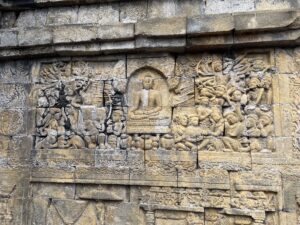
INSTRUCTORS:
Nida Shaikh is a Mental Health Practitioner from Pune, India practicing for the last 9 years. She runs a Mental Health and Therapy space called Manah Center for Mental Well Being and plays the role of a Founder, Director and Senior Therapist at the same. She holds a Masters in Clinical Psychology and a Post Graduate Diploma in Applied Mahayana and Buddhist Psychology and Ethics from University of Pune. Over the 9 years, Nida has worked majorly with the addict population along with populations struggling with stress, anxiety, depression, mood and personality disorders, Schizophrenia, relationship related challenges. She has conducted various corporate workshops aimed at team-work, leadership skills, employee performance enhancement through mindfulness, developing a healthy work-life balance, stress management and anger management. Other than direct client interaction Nida loves to train and mentor budding psychologists and undergraduate psychology students while running a project called Living With Metta.
Rev. Nemoto Jotetsu 根本一徹 (Japan) is a priest of the Rinzai Zen Myoshin-ji denomination and abbot of Daizen-ji temple in Gifu prefecture. After a troubled upbringing in a divorced family in Tokyo, Rev. Nemoto entered one of the strictest Zen training centers in Japan and immersed himself in its rigourous monastic life for over five years. Returning to society in the early 2000s, he has aplied that same rigorous attitude to counseling thousands of people who wish to die or feel they cannot go on living. His Tabidachi death workshop is a well regarded experience for not only the suicidal but anyone searching to discover the meaning of their life.
Rev. Takemoto Ryogo 竹本了悟 (Japan) is one of the founders of SOTTO, the Kyoto Self-Death & Suicide Counseling Center, established by priests of the Jodo Shin Pure Land Hongan-ji denomination in 2010. Besides telephone counseling and public awareness activities, SOTTO has been actively training counselors in their unique Pure Land Buddhist-based approach. It has also done groundbreaking work in establishing cooperative ventures with the Japanese government, which has for decades excluded religious professionals for public social work. In 2018, he co-founded the Tera Energy Buddhist electrical company as a social enterprise whose profits support Buddhist-based community building to get at the root of suicide in social isolation.
Rev. Fujii Kazuha 藤井一葉 (Japan) is a priest of the Jodo Shin Pure Land Hongan-ji denomination. She joined SOTTO in the early 2010s and has organized Death Cafés, casual discussions about death with fellow monks. She studied in the Graduate School of Practical Training Studies at Ryukoku Buddhist University and afterwards interned at a hospital in Osaka under the Professional Association for Spiritual Care and Health (PASCH). She presently works with Rev. Takemoto at Tera Energy.
Hendrick Tanuwidjaja (Indonesia) journeys at the confluence of traditions. A Shingon Buddhist lay priest-in-training at Mahabodhi Monastery, in the lineage of Daigoji (Japan) and Pudong Temple (Taiwan), he is also a Chan disciple in the Dharma Drum Mountain tradition and a student of Engaged Buddhism with Upaya Zen Center. Certified in teaching Mindfulness-Based Stress Reduction (MBSR) and Mindfulness-Based Cognitive Therapy (MBCT) from MBPTI UCSD and OMC, he is also practicing as a fengshui architect, as he bridges inner awakening with the shaping of sacred space. As author of Soul of Borobudur: The Philosophy of Cakravartin’s Mandala, Hendrick reimagines Borobudur as a living mandala of the cakravartin. Through Mindfulness Nusantara, he tends Borobudur as a luminous compass for a civilization seeking renewal.
Jonathan Watts (U.S.A./Japan) graduated from Princeton University with a B.A. in Religious Studies and also a minor in Political Science. He immediately moved to Asia and spent three years working in the INEB Secretariat in Bangkok, while studying and practicing at the forest monastery of Buddhadasa Bhikkhu. In 1993, he moved to Japan and spent the decade coordinating the INEB Think Sangha, an engaged Buddhist “think tank” working on a variety of social issues. In 1999, he joined the Jodo Pure Land denomination research institute and edited and co-wrote Buddhist Care for the Dying and Bereaved with Rev. Yoshiharu Tomatsu. In 2006, he joined Kodo Kyodan’s International Buddhist Exchange Center (IBEC) from which he has been involved in a wide variety of engaged Buddhist issues in Japan, now published in a two volume set called Engaged Buddhism in Japan. Since this time, he has also helped develop Japan’s first Buddhist chaplaincy training program, the Rinbutsuken Institute of Engaged Buddhism, where he teaches Buddhist social analysis and systems care.

